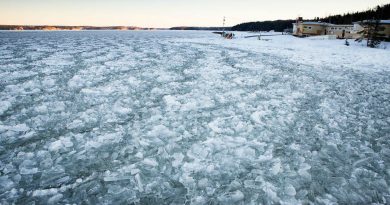Murkowski, King seek to enlist other U.S. senators in an Arctic caucus

Coming soon to the U.S. Capitol is a new group of lawmakers: the Senate Arctic Caucus.
As of Tuesday, the group was just a nucleus of two — Alaska Sen. Lisa Murkowski, a Republican, and Maine Sen. Angus King, an independent who is part of the Senate’s Democratic minority.
But this week, Murkowski said, she and King are formally inviting other senators to join.
“What I am trying to do is raise awareness about all things Arctic. I’m trying to allow members to see and appreciate that the Arctic is not just about Alaska,” she said in an interview Tuesday. It is true that Alaska holds the only U.S. Arctic territory, she said. “But if it’s all about Alaska, they’re never going to take the lead and assume the role that we should as an Arctic nation.”
Focus on Arctic infrastructure and information
The caucus, Murkowski said, will likely offer legislation to achieve goals like boosting Arctic infrastructure and information with new weather stations, buoy tenders, mapping and modernized navigational charts.
The timing for launch of the Arctic Caucus is no coincidence. The United States is scheduled to assume chairmanship later this year of theArctic Council, the group of eight nations with Arctic territory. The two-year chairmanship, which revolves among the member nations, is an opportunity for the U.S. to play a bigger role in guiding the future of the rapidly changing circumpolar north.
The invitations to Murkowski’s and King’s Senate colleagues are also timed to coincide with a week of Arctic-related activities in Washington. Those include a hearing in the Murkowski-chaired Senate Energy Committee, a day-long forum on Arctic science that is being held by the Consortium for Ocean Leadership, a two-day meeting of the U.S. Arctic Research Commission and and an “Arctic Leaders Forum” to be hosted Thursday by the Pacific NorthWest Economic Region, a regional group representing U.S. states and Canadian provinces and territories.
Arctic issues can affect states in Lower 48
There are plenty of reasons for political leaders from states far from the Arctic Circle to be interested in the Arctic, Murkowski said.
Take Iowa and its corn exports, for example, she said. “What happens when you have shipping routes that can actually take days off your transit and save you in shipping costs?” she said.
For Maine, a state that sends more than half of its exports to Canada, interest in Arctic affairs is a natural fit, Murkowski said.
The state sent a large delegation to last year’s Arctic Circle conference in Iceland, she noted. Sen. King, one of the Maine leaders paying keen attention to the far north, in January weighed in to support President Obama’s Arctic policies and last month delivered a speech about the need for U.S. leadership in the Arctic to the Carnegie Endowment for International Peace. Maine’s Bowdoin College is also home to anArctic Studies Center.
A new force is calling attention to Arctic issues in the Lower 48 — the unusual and topsy-turvy winter weather pattern, with extreme cold and snowstorms reaching far into the south and warm, rainy weather extending far into Alaska and elsewhere in the far north. The unusual patterns are blamed on a meandering jet stream. That change from the jet stream’s normal west-to-east movement is, according to some scientists, attributable at least in part to atmospheric effects of dramatic summer and fall sea ice declines and other Arctic changes that areamplifying warming in the far north.
Murkowski, who has repeatedly criticized the Obama administration for what she characterizes as too much emphasis on Arctic climate change and too little on Arctic development, acknowledged that many people in the lower latitudes are wondering about weather that is “just really different right now,” including heavy snows on the East Coast, and the possible link to rapid climate change in the Arctic.
“I can tell you that people in Boston are having an upfront and personal relationship to the Arctic right now,” she said.
Related stories from around the North:
Asia: China’s silk road plans could challenge Northern Sea Route, Blog by Mia Bennett
Canada: Report warns more Arctic shipping will increase warming, affect health, Radio Canada International
Norway: Norway, Russia committed to Barents cooperation, despite divisions over Ukarine, Barents Observer
Russia: Russian Arctic regions of Murmansk and Yamal widen cooperation, Barents Observer
Sweden: Arctic train line in Nordics would open up polar potential, Barents Observer
United States: U.S. needs Arctic military strategy says defense secretary, Alaska Public Radio Network



